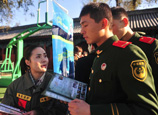
Another matter worthy of consideration is the development of yuan offshore markets in Hong Kong and Singapore, she said.
"So we've signed agreements with Singapore and the (Hong Kong Monetary Authority) to ensure there is yuan liquidity in offshore markets."
Even though China is India's immediate neighbor and chief trading partner, and even though the countries' combined population makes up 40 percent of the world's, they have no currency swap agreement with each other.
"The India-China trade is one of the fastest growing bilateral trades in the world," said Ajit Ranade, group chief economist of the Indian conglomerate Aditya Birla Group. He noted that India has a $35 billion to $40 billion annual deficit in trade with China.
India now has a "huge need" for long-term investment into its infrastructure. Indian Prime Minister Manmohan Singh has gone so far as to estimate the country will require about $1 trillion for that purpose in the next five to six years.
To help the country reach that goal, Ranade suggested Chinese investors put yuan into infrastructure in India and that India later pay the debt back using the same currency.
"It would eliminate currency fluctuation risks and the Chinese investors would be assured of returns, while India would be assured of long-term funds," he said. "It would be a win-win proposition."
Deeming the suggestion an uncommon idea, H. R. Khan, deputy governor of the Reserve Bank of India, the country's central bank, said India's opportunity to test the waters is constrained.
New Delhi has a $2 billion agreement with the South Asian Association for Regional Cooperation, a development organization, and is trying to expand on a $3 billion agreement that it had had with Japan before it expired last year.
India doesn't have a similar agreement with China, but Khan said Indian companies have an opportunity to borrow yuan.
"After we have gained some experience, we will possibly expand the use of yuan for trade and investment," Khan said. "For now, we are testing the waters."
Andrew Khoo, assistant managing director of the Singapore Monetary Authority, advocated the use of regional swap agreements such as the Chiang Mai Initiative, which was started in 2010. Among the participants in the initiative is the 10-member Association of Southeast Asian Nations, as well as China, Japan and South Korea.
sarkar@chinadailyapac.com















 Traffic accident injures 40 people in HK
Traffic accident injures 40 people in HK


![]()
